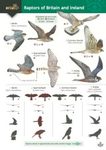By: José Hernán Sarasola(Editor), Juan Manuel Grande(Editor), Juan José Negro(Editor)
522 pages, 90 colour photos and colour illustrations, 17 b/w illustrations, tables
![Birds of Prey Birds of Prey]()
Click to have a closer look
About this book
Contents
Customer reviews
Biography
Related titles
About this book
Birds of Prey provides the state-of-the-art on most of the topics involved in the ecology and conservation of birds of prey. With chapters authored by the most recognized and prestigious researchers on each of the fields, Birds of Prey will become an authorized reference volume for raptor biologists and researchers around the world.
Contents
Part I. General Biology
1. Phylogeny, Taxonomy, and Geographic Diversity of Diurnal Raptors: Falconiformes, Accipitriformes, and Cathartiformes / Mindell, David P. (et al.) - Pages 3-32
2. Behavioural Ecology of Raptors / Negro, Juan José (et al.) - Pages 33-62
3. Breeding and Nesting Biology in Raptors / Tapia, Luis (et al.) - Pages 63-94
4. Dispersal in Raptors / Serrano, David - Pages 95-121
5. Raptor Migration / Bildstein, Keith L. - Pages 123-138
6. Raptors as Seed Dispersers / Pérez-Méndez, Néstor (et al.) - Pages 139-158
Part II. Raptors in Human Landscapes
7. Raptors and People: An Ancient Relationship Persisting Today / Negro, Juan José - Pages 161-176
8. Costs and Benefits of Urban Living in Raptors / Solaro, Claudina - Pages 177-196
9. Birds of Prey in Agricultural Landscapes: The Role of Agriculture Expansion and Intensification / Grande, Juan Manuel (et al.) - Pages 197-228
10. Toxicology of Birds of Prey / Smits, Judit (et al.) - Pages 229-250
11. Lead Poisoning in Birds of Prey / Krone, Oliver - Pages 251-272
12. Raptor Electrocutions and Power Line Collisions / Eccleston, Duncan T. (et al.) - Pages 273-302
13. Impact of Renewable Energy Sources on Birds of Prey / Dwyer, James F. (et al.) - Pages 303-321
Part III. Raptor Conservation
14. Use of Drones for Research and Conservation of Birds of Prey / Canal, David (et al.) - Pages 325-337
15. Conservation Genetics in Raptors / Martínez-Cruz, Begoña (et al.) - Pages 339-371
16. Conservation Status of Neotropical Raptors / Sarasola, José Hernán (et al.) - Pages 373-394
17. Conservation Threats and Priorities for Raptors Across Asia / Concepcion, Camille B. (et al.) - Pages 395-418
18. Conservation and Ecology of African Raptors / Amar, Arjun (et al.) - Pages 419-455
19. Old World Vultures in a Changing Environment / Margalida, Antoni (et al.) - Pages 457-471
20. Raptor Conservation in Practice / Watson, Richard T. - Pages 473-498
Customer Reviews
Biography
José Hernán Sarasola received his degree in Natural Resources from the National University of La Pampa (UNLPam), Argentina, and earned his Ph.D. in Biology at the University of Seville (Spain) after being granted a doctoral fellowship at the Donana Biological Station. He is one of the co-founders of the Center for the Study and Conservation of Birds of Prey in Argentina (CECARA) where he has served as vice-director and director. He has conducted field research on a variety of species in South America and Europe focusing on raptor population ecology, migration and conservation. He is a researcher at the National Scientific and Technical Research Council of Argentina (CONICET) and adjunct professor of Ecology at UNLPam. He has been visiting scholar at University of Saskatchewan (Canada) and the Autonomous University of Madrid (Spain).
Juan Manuel Grande has a B.S. degree in Biology from the Universidad de Barcelona and Ph.D in Biology from the University of Seville, both in Spain. He's been a postdoc researcher at the University of Saskatchewan, in Canada and is a researcher at the National Scientific and Technical Research Council of Argentina (CONICET). He is vice director of the Center for the Study and Conservation of Raptors in Argentina (CECARA) and professor of Biology at the Universidad Nacional de La Pampa. He has served as Director at Large of the Raptor Research Foundation. His main research interests are linked to birds of prey ecology and the effects of anthropic transformation on natural landscapes on this group of birds.
Juan José Negro's research interests focus on evolutionary ecology and conservation of endangered birds of prey. He is an associate editor of Animal Biodiversity and Conservation and the Journal of Unmanned Vehicle Systems. He is also vice-president of the Spanish Society of Ethology and Evolutionary Ecology. Negro graduated from the Faculty of Biology at the University of Sevilla, where he later earned a PhD in Biology. He has been a visiting scholar at CalPoly, California, and Heidelberg University, Germany. He held a postdoc position at McGill University, Canada and was director of Donana Biological Station. Negro is a professor of research at the Spanish Council for Scientific Research. He received the Hamerstrom Award from The Raptor Research Foundation in recognition of his contributions to the understanding of raptor ecology and natural history.
By: José Hernán Sarasola(Editor), Juan Manuel Grande(Editor), Juan José Negro(Editor)
522 pages, 90 colour photos and colour illustrations, 17 b/w illustrations, tables


































